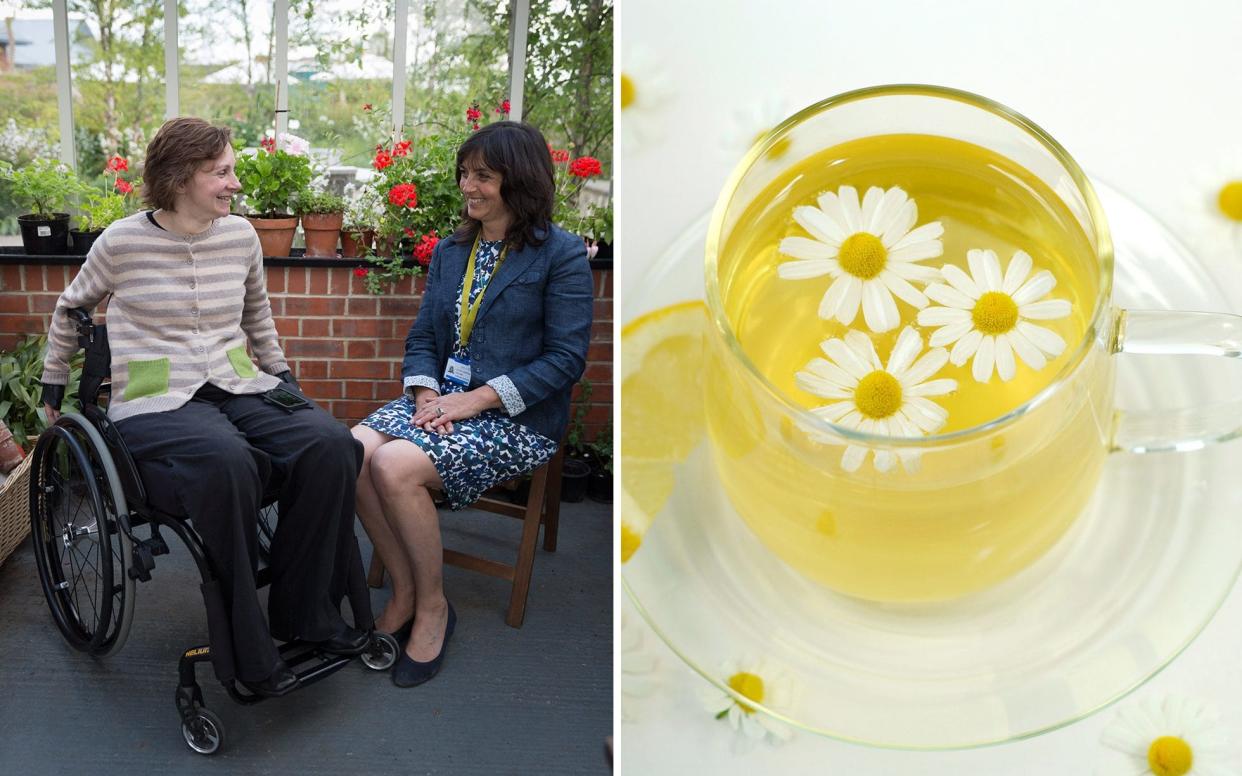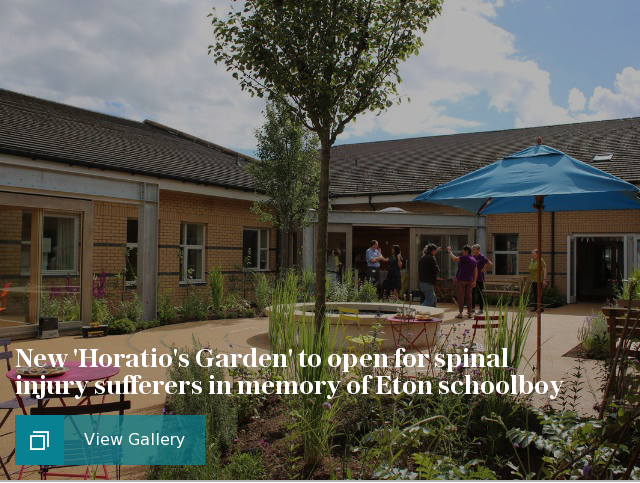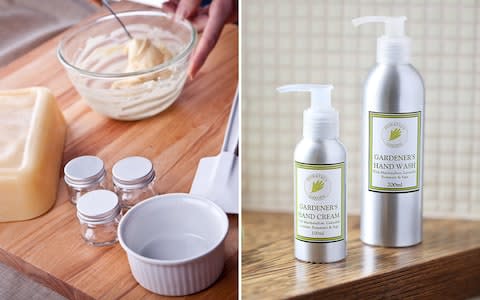How the Horatio's Garden charity is harnessing plant power with the help of a medical herbalist

A herbalist has teamed up with Horatio’s Garden, a charity which specialises in garden therapy for NHS spinal care patients, to create a range of mood and health-boosting bath oils and bath salts in time for the gift-giving season.
Catherine Marshall, the founder of Herbal Harmony, is a qualified member of the National Institute of Medical Herbalists. She has already created a hand cream and gardener’s hand wash in association with the charity, made with soothing lavender, antiseptic rosemary and medicinal sage which, she says, was “designed with the idea of a therapeutic, feel-good, healing garden in mind, intended to transport you back to the herb garden.”
The green-fingered tend to rate their own mental health higher
Marshall’s mission is to create products for patients without chemicals or harmful irritants. “I like to make my own from scratch, so that I know what’s in them. It’s particularly important for people who have eczema or psoriasis," she explains. "For those conditions, I’d recommend marigold and calendula, which is good for dry skin. Chickweed is another one that’s good for itchy skin.”
The new range includes a luxurious floral bath oil with lavender, geranium and sensuous ylang ylang. There’s a set of three bath salts, a relaxing, calming one to match the oil, a refreshing mint and eucalyptus concoction, and an uplifting, reviving grapefruit blend. They also contain Epsom salts, to relieve muscular aches and pains.
But what exactly is a herbalist, and why are they becoming so much more common? Perhaps most importantly, is it just a bunch of hocus pocus?

The answer is no, it's not. According to the National Institute of Medical Herbalists, a herbalist makes use of traditional medicinal plants backed up by modern scientific research and clinical trials. A Qualified Medical Herbalist has a BSc or equivalent in herbal medicine, and has studied orthodox medicine as well as plant medicine.
Herbalists take a holistic approach to illness, treating the underlying cause of disease rather than just the symptoms. They are able to prescribe herbal remedies to be used alongside other medication and treatments (that said, the NHS does offer strict advice on the risks of buying herbal medicines online or by mail order, tips on what to look for and pointers on when to avoid them.)

It's an approach to health which, according to Marshall, is easy to incorporate into your day - even if you're not a qualified medical herbalist yourself. Nettles are a "natural antihistamine", for example; when the plant dries out, the acid in the sting is neutralised - and then it can be used to treat allergies and ailments such as hay fever. "Nettles can be great for all kinds of allergies, hay fever especially, but also skin allergies as they have a blood cleansing properties," she says.
One of the easiest ways to use nettles and other common herbs in home remedies is by making tea. "When picking nettles to use in tea, just use the top four leaves of young plants," Marshall recommends. "Spring is an ideal time for this as they are abundant then, although there are still some nettles around now." (Wear gloves to avoid stings.)
The leaves can then either be brewed fresh if you have access to a daily supply of fresh nettles, or dried at home (a dehydrator is ideal for this) and then stored for up to a year. "I often mix the nettles with elderflower for hay fever or with dandelion for a skin purifying tea blend," she continues. "Use 1-2 teaspoons of dried nettles or 2-3 teaspoons of fresh nettles. Add the nettles to a cup of freshly boiled water, infuse for at least 10 minutes and drink up to 3 cups per day."
Meanwhile, fresh peppermint leaves are nature’s gift to those who suffer from indigestion (try a cup of fresh mint tea after dinner). Marshall also loves growing Roman chamomile for tea, which is easy to grow in pots, and can often be found foraging for elderflower, which she describes as "a mucus membrane tonic that helps to clear the sinuses.”

Therapeutic gardening is not to be discounted as just a fad on the mindfulness bandwagon, either: according to a report by The Kings Fund, gardens (and gardening) really can contribute to keeping you both well and independent.
It shows not only that the green-fingered tend to rate their own mental health higher, but also that increased exposure to green spaces in the long term is also linked to reductions in physical health problems, including heart disease, cancer and musculoskeletal conditions. It’s linked to reduced levels of obesity too, and (perhaps unsurprisingly) to encouraging higher levels of physical activity.

Horatio’s Garden is an example of a charity working hard to help people to benefit from gardening. Set up by Dr Olivia Chapple in honour of her son Horatio, who at 17 was tragically killed by a polar bear, Horatio’s Garden offers garden therapy to patients with spinal injuries: the first Horatio’s Garden opened in Salisbury in 2012, and won three prestigious Society of Garden Designers Awards.
According to Chapple, gardens can be therapeutic in many senses: "For many of our beneficiaries the gardens are a place of beauty and sanctuary, a contrast to everything clinical in the wards. They are a place for privacy, tears, thoughts and reflection but also a place for social rehabilitation – where patients can host their visitors and share an experiences with them. It makes visiting less stressful and more positive for everyone.
Patients also enjoy the gentle therapy of gardening both as a purposeful activity – plant some seeds, watch them grow, water them, tend them and then give them to your partner – that is very rewarding. This summer’s audit showed 100% of patients using Horatio’s Gardens say that the garden has improved their sense of wellbeing."
A post shared by Horatios Garden (@horatiosgarden) on Jul 17, 2015 at 11:03am PDT
Following its success running gardening sessions for patients with specialist tools in their beautifully designed gardens, and growing fresh produce, the charity aims to roll out the concept nationally at ten other NHS spinal injury centres.
Horatio’s Garden Scotland was designed by Catherine MacDonald and opened in September 2016. The garden is divided into six distinct spaces, each with a different purpose and designed to stimulate different senses – sight, smell, touch. The planting is designed to encourage wildlife into the garden with plenty of bird feeders. Courtesy of Hartley Botanic, there is a magnificent greenhouse which is the volunteer HQ and is surrounded by raised beds and areas for horticultural therapy sessions.

Next in line, Horatio’s Garden Stoke Mandeville is set to open this year, designed by Joe Swift, an RHS Gold medal winner and presenter of BBC Gardeners’ World.
The proposed garden will include secluded areas for patients to be on their own or with visitors, a rill and water feature. The highly perennial, sensory planting will create fabulous swathes of colour all year round whilst evergreens will give winter structure. The planting will be bird and butterfly friendly.

A garden room, designed by architect Andrew Wells, will provide a place for patients to enjoy the garden even when the weather is poor. It will be a light airy sanctuary where patients can make a cup of tea, share lunch with visitors and participate in the volunteer led activities.
The charity has also teamed up award-winning garden designer Bunny Guinness, to transform the garden around the Midland Centre for Spinal Injuries in Oswestry, creating a beautiful sanctuary for patients and their families.


